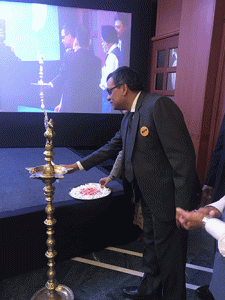Indian travellers pay 29% extra on last minute flight bookings
NHAI to focus more on on providing safe, sustainable, accessible, clean and green mobility in the country
Published on December 7, 2018
New Delhi : The length of highways completed by the Ministry of Road Transport and Highways, the NHAI and the National Highways & Infrastructure Development Corporation Limited (NHIDCL) in 2017-18 was 9,829 km, or roughly 27 km per day. This year we have set a target of 33-35 km per day.
 “Even as there is nearly a 30 per cent increase in the per day per kilometer of road construction target for the fiscal, in terms of lane kilometers, the target remains 94 km lane per day by the end of this year. A lane-km is defined as a kilometer-long segment of a road that is a single lane in width” said Mr R K Pandey, Member projects , National Highway Authority of India (NHAI) while inaugurating a day long seminar on ‘Innovation in Highways and Waterways’ organized by an NGO Chemtech Foundation , Ministry of Road Transport and Highways (MoRTH) and Ministry of Steel.
“Even as there is nearly a 30 per cent increase in the per day per kilometer of road construction target for the fiscal, in terms of lane kilometers, the target remains 94 km lane per day by the end of this year. A lane-km is defined as a kilometer-long segment of a road that is a single lane in width” said Mr R K Pandey, Member projects , National Highway Authority of India (NHAI) while inaugurating a day long seminar on ‘Innovation in Highways and Waterways’ organized by an NGO Chemtech Foundation , Ministry of Road Transport and Highways (MoRTH) and Ministry of Steel.
“The ultimate target is 45 KM per day ,speed of construction, materials being used, reducing thickness of bridges as well as focus on sustainability and smart mobility are major challenges NHAI is facing to meet the target” said Mr R K Pandey
“ Despite pressure of constructing road infrastructure with speed, NHAI is focusing on providing safe, sustainable, accessible, clean and green mobility in the country. A sustainable mobility in the country will address a lot of issues coming in the way of safe system for the road users, for the vehicles plying on them and traffic rules adherence” said Mr Pandey
“India’s growing and vibrant Infrastructure programme has resulted in an impressive build-up of the highway sector. Increased infrastructure spending and funding for road construction have led to a significant growth in the number of highway construction projects in India. The safety of road users, workers as well as environment protection are a matter of concern during construction activities worldwide. NHAI is fast changing it contract system and has set up high powered committee in the MoRTH to clear the projects as per requirements” he added.
 “In a world of smart, connected and autonomous mobility what is the role that sustainable infrastructure plays . The need for sustainable solutions is growing rapidly around the world. As the original inventor of stainless steel, we have unparalleled amount of technical and product expertise, which brings us significant competitive advantage” said Mr Yatinder Pal Singh Suri , Chairman, Process Plant and Machinery Association of India (PPMAI ) and India head Outokumpu while speaking on the occasion .
“In a world of smart, connected and autonomous mobility what is the role that sustainable infrastructure plays . The need for sustainable solutions is growing rapidly around the world. As the original inventor of stainless steel, we have unparalleled amount of technical and product expertise, which brings us significant competitive advantage” said Mr Yatinder Pal Singh Suri , Chairman, Process Plant and Machinery Association of India (PPMAI ) and India head Outokumpu while speaking on the occasion .
Experts attending the seminar also stressed on the need of sustainable infrastructure having long life in the coastal and hill states in the country .
“The collapse of various bridges in coastal area recently due to corrosion and natural calamities in hill states In addition to causing severe damage and threat to public safety, corrosion especially in coastal states including Gujarat, Andhra Pradesh, Kerala, Maharashtra, West Bengal and Odisha where salt content is high in atmosphere, water, rain and air disrupts. operations and requires extensive repair and replacement of failed assets. India is a resource crunched nation it needs sustainable and maintenance free Infrastructure that has long span of life.” Said Mr Andrew Backhouse, Development and customer service ,Outokumpu Finland based stainless steel company.
“Stainless steel structural elements and reinforcing bars in concrete have been used in coastal regions to achieve more than 100 years of maintenance free life. Duplex stainless steel storage tanks are in use world wide to store oils and corrosive chemicals with life cycle cost advantages over carbon steel. Duplex Stainless steel is essential for desalination of sea water into drinking water. Also for drinking water storage and distribution for humans in safe, clean and hygienic manner. Railway coaches, Metro coaches, Wagons becoming maintenance free and lighter to save on haulage energy costs with stainless steel. Railway stations can go for clean drinking water in taps through stainless steel storage tanks and pipelines for distribution. Stainless Railway bridges along coastlines will also become maintenance free.” Said Mr Backhouse.
“Stainless steel is the fastest growing segment of the metals industry, its applications are diverse and new applications are being constantly being developed. It has become major part in all of our lives, and has truly changed the world. In India demand for stainless steel is on constant increase due to awareness about the product and availability of right grades and sizes. The demand for the corrosion free metal is on increase in Architecture , Construction high end industries including Oil & Gas, Energy and shipping-related industries, railways, ports, infrastructure and automotive where corrosion is a serious issue.” said Mr Backhouse.





















